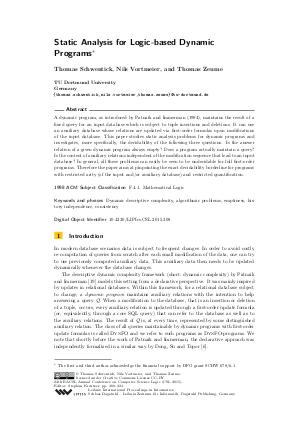Static Analysis for Logic-based Dynamic Programs
Authors Thomas Schwentick, Nils Vortmeier, Thomas Zeume
-
Part of:
Volume:
24th EACSL Annual Conference on Computer Science Logic (CSL 2015)
Part of: Series: Leibniz International Proceedings in Informatics (LIPIcs)
Part of: Conference: Computer Science Logic (CSL) - License:
 Creative Commons Attribution 3.0 Unported license
Creative Commons Attribution 3.0 Unported license
- Publication Date: 2015-09-07
File

PDF
LIPIcs.CSL.2015.308.pdf
- Filesize: 0.52 MB
- 17 pages
Document Identifiers
Subject Classification
Keywords
- Dynamic descriptive complexity
- algorithmic problems
- emptiness
- history independence
- consistency
Metrics
- Access Statistics
-
Total Accesses (updated on a weekly basis)
0PDF Downloads0Metadata Views
Abstract
The goal of dynamic programs as introduced by Patnaik and Immerman (1994) is to maintain the result of a fixed query for an input database which is subject to tuple insertions and deletions. To this end such programs store an auxiliary database whose relations are updated via first-order formulas upon modifications of the input database. One of those auxiliary relations is supposed to store the answer to the query. Several static analysis problems can be associated to such dynamic programs. Is the answer relation of a given dynamic program always empty? Does a program actually maintain a query? That is, is the answer given of the program the same when an input database was reached by two different modification sequences? Even more, is the content of auxiliary relations independent of the modification sequence that lead to an input database? We study the algorithmic properties of those and similar static analysis problems. Since all these problems can easily be seen to be undecidable for full first-order programs, we examine the exact borderline for decidability for restricted programs. Our focus is on restricting the arity of the input databases as well as the auxiliary databases, and to restrict the use of quantifiers.
Cite As Get BibTex
Thomas Schwentick, Nils Vortmeier, and Thomas Zeume. Static Analysis for Logic-based Dynamic Programs. In 24th EACSL Annual Conference on Computer Science Logic (CSL 2015). Leibniz International Proceedings in Informatics (LIPIcs), Volume 41, pp. 308-324, Schloss Dagstuhl – Leibniz-Zentrum für Informatik (2015)
https://doi.org/10.4230/LIPIcs.CSL.2015.308
BibTex
@InProceedings{schwentick_et_al:LIPIcs.CSL.2015.308,
author = {Schwentick, Thomas and Vortmeier, Nils and Zeume, Thomas},
title = {{Static Analysis for Logic-based Dynamic Programs}},
booktitle = {24th EACSL Annual Conference on Computer Science Logic (CSL 2015)},
pages = {308--324},
series = {Leibniz International Proceedings in Informatics (LIPIcs)},
ISBN = {978-3-939897-90-3},
ISSN = {1868-8969},
year = {2015},
volume = {41},
editor = {Kreutzer, Stephan},
publisher = {Schloss Dagstuhl -- Leibniz-Zentrum f{\"u}r Informatik},
address = {Dagstuhl, Germany},
URL = {https://drops.dagstuhl.de/entities/document/10.4230/LIPIcs.CSL.2015.308},
URN = {urn:nbn:de:0030-drops-54221},
doi = {10.4230/LIPIcs.CSL.2015.308},
annote = {Keywords: Dynamic descriptive complexity, algorithmic problems, emptiness, history independence, consistency}
}
Author Details
References
-
Samir Datta, Raghav Kulkarni, Anish Mukherjee, Thomas Schwentick, and Thomas Zeume. Reachability is in DynFO. In ICALP, pages 159-170, 2015.

-
Guozhu Dong, Leonid Libkin, and Limsoon Wong. On impossibility of decremental recomputation of recursive queries in relational calculus and SQL. In DBPL, page 7, 1995.

-
Guozhu Dong, Leonid Libkin, and Limsoon Wong. Incremental recomputation in local languages. Inf. Comput., 181(2):88-98, 2003.

-
Guozhu Dong and Jianwen Su. Deterministic FOIES are strictly weaker. Ann. Math. Artif. Intell., 19(1-2):127-146, 1997.

-
Guozhu Dong and Jianwen Su. Arity bounds in first-order incremental evaluation and definition of polynomial time database queries. J. Comput. Syst. Sci., 57(3):289-308, 1998.

-
Guozhu Dong, Jianwen Su, and Rodney Topor. Nonrecursive incremental evaluation of datalog queries. Annals of Mathematics and Artificial Intelligence, 14, 1995.

-
Catherine Dufourd, Alain Finkel, and Philippe Schnoebelen. Reset nets between decidability and undecidability. In ICALP, pages 103-115, 1998.

-
Heinz-Dieter Ebbinghaus and Jörg Flum. Finite model theory. Perspectives in Mathematical Logic. Springer, 1995.

-
Paul Erdős and Richard Rado. Intersection theorems for systems of sets. Journal of the London Mathematical Society, s1-35(1):85-90, 1960.

-
Wouter Gelade, Marcel Marquardt, and Thomas Schwentick. The dynamic complexity of formal languages. ACM Trans. Comput. Log., 13(3):19, 2012.

-
Erich Grädel and Sebastian Siebertz. Dynamic definability. In ICDT, pages 236-248, 2012.

-
William Hesse. Dynamic Computational Complexity. PhD thesis, University of Massachusetts Amherst, 2003.

-
John E. Hopcroft and Jean-Jacques Pansiot. On the reachability problem for 5-dimensional vector addition systems. Theor. Comput. Sci., 8:135-159, 1979.

-
Stasys Jukna. Extremal combinatorics, volume 2. Springer, 2001.

-
Stefan Kratsch and Magnus Wahlström. Preprocessing of min ones problems: A dichotomy. In ICALP, pages 653-665, 2010.

-
Leonid Libkin. Elements of Finite Model Theory. Springer, 2004.

-
Dániel Marx. Parameterized complexity of constraint satisfaction problems. Computational Complexity, 14(2):153-183, 2005.

-
Marvin L. Minsky. Computation: finite and infinite machines. Prentice-Hall, Inc., Upper Saddle River, NJ, USA, 1967.

-
Sushant Patnaik and Neil Immerman. Dyn-FO: A parallel, dynamic complexity class. In PODS, pages 210-221. ACM Press, 1994.

-
Thomas Schwentick, Nils Vortmeier, and Thomas Zeume. Static analysis for logic-based dynamic programs. CoRR, abs/1507.04537, 2015.

-
Boris A. Trahtenbrot. Impossibility of an algorithm for the decision problem in finite classes. AMS Translations, Series 2, 23:1-5, 1963.

-
Nils Vortmeier. Komplexitätstheorie verlaufsunabhängiger dynamischer Programme. Master’s thesis, TU Dortmund University, 2013. In German.

-
Thomas Zeume. The dynamic descriptive complexity of k-clique. In MFCS, pages 547-558, 2014.

-
Thomas Zeume and Thomas Schwentick. Dynamic conjunctive queries. In ICDT, pages 38-49, 2014.

-
Thomas Zeume and Thomas Schwentick. On the quantifier-free dynamic complexity of reachability. Inf. Comput., 240:108-129, 2015.

